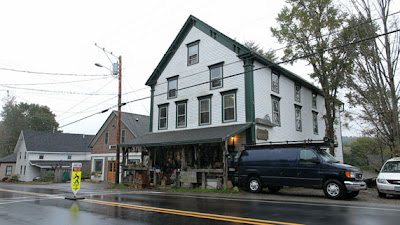story by Zach Pontz
Located in the middle of the state of Maine, Liberty is not far from the capital, Augusta. The town is small (the most recent estimate is a population of 932) but charming. My parents bought a house there when I was seven years old, and I’ve visited in the summer for a week or two ever since. There are a grand total of two shops open on a daily basis: a store that sells T-shirts and the Liberty Tool Company.
As a child I couldn’t appreciate the unique nature of a place like Liberty Tool, which was started by H.G. “Skip” Brack in 1976 as an addition to his other stores operating under the Jonesport Wood Company umbrella. With its ageless tools, trinkets, and other bric-a-brac, what kid really can? I thought it was boring. I wanted to spend the summer hanging with my friends at the beach, devouring fast food, and eating candy. I put little stock in the quality of things and more so in the quantity. But, as I’ve grown older and more mature, I’ve found it necessary to ornament my life with items of real worth and value. The importance of this has become especially clear to me in the last decade or so, as the continued erosion of those things I once held dear — books and music records immediately come to mind — turns the world I inhabit digital. And that’s why Liberty Tool carved out such a special place in my life.
When I came home from another trip to Maine this summer it dawned on me that Etsy would be a perfect platform, and that Andrew Watson — who directed this video — would be a perfect fit for capturing the essence of Liberty Tool Company. So I spoke with Andrew, a tool enthusiast if there ever was one, and before I could finish my thought, he committed to the project.
The store carries everything from teddy bears, containers of random “stuff”— screws and whatever else can fit into the mason-sized jars — to old tennis rackets, books, and records. But it is the first floor, dedicated to tools that span the length of the industrial revolution, that is the main attraction. “We’ve got tools that date from the earliest days of the revolution to just yesterday,” Brack told us.
Brack’s main focus is to help support a sustainable local economy. By salvaging up to 1 ½ tons of tools each week from around New England and reselling at affordable prices, he’s able to do just that. “I price things intuitively, but I do it so people can afford it. People around here aren’t rich, and I’m conscious of that.”
One of those locals, Joshua Leavitt, is an area woodworker who frequents the tool shop, especially on Saturdays when Brack arrives with newly acquired tools. We hung out with Josh at his woodworking shop, chatted about Skip, and observed Josh at work. “He’s got so much cool stuff, it’s fun to look through the place,” Josh told us. A lot of other people feel that way, too. Brack estimates some 20,000 customers have been through the place since he first opened its doors.
Brack, who has a museum adjacent to the shop dedicated to the history of tools, claims to be the definitive resource for how tools are made in the United States. And like all men of obsessive dedication and knowledge, he takes his objects none too leniently: “Tools are a function of death, taxes, and bankruptcy,” he told us.
Whatever the case may be, the unique nature of the shop isn’t lost on many. Leavitt was effusive in his praise. “He’s great, I’m just really lucky to have a resource like the tool shop near me.” Andrew and I, while envious, also agree.






0 comments:
Post a Comment